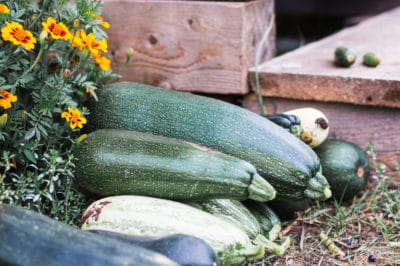What Is Companion Planting
Companion planting is purposefully growing two plants near each other to improve the health, flavor, and beauty of the plants. Here are ways companion planting can improve your plants:
- Deters Harmful Pests
- Attracts Beneficial Bugs
- Adds Nutrients to Shared Soil
- Provides Shading from Extreme Heat
- Provides Mulch
Companion Plants to Squash
Some Native Americans have practiced companion planting with squash for thousands of years. The “Three Sisters” is a practice of growing corn, beans or peas, and squash together on a mound or hill. The corn becomes a trellis to support the beans or peas. The beans or peas fix (make their own) nitrogen in the soil for the nearby squash and corn.
The “Three Sisters” practice is still used today by many gardeners. In addition to this practice, there are other companion plantings that gardeners successfully use.
Nasturtium
Nasturtium is an annual flowering plant that is beneficial to squash plants. This plant deters squash bugs. Nasturtium also becomes a bait plant to aphids, keeping them away from the squash plant. An added bonus is that nasturtium leaves and flowers are completely edible.
Marigold
The common or French marigold plant (not pot marigold or Calendula officinalis) emits an odor that deters pests. These beautiful, easy to grow flowers attract bees and can be planted anywhere in the garden. The common marigold is a beneficial companion plant to many plants including squash plants.
Tansy
Tansy is a perennial, herbaceous flowering plant known for its natural insecticidal and medicinal properties. A member of the aster family, this fragrant yellow-flowering herb deters squash bugs.
Borage
Borage is a nutritious, flowering herb that also deters pests from squash plants. This edible, purple-flowering plant also can enhance the flavor of squash if planted nearby. Also known as starflower, it can self-seed itself in the garden from year to year.
Catnip
Catnip, a feline attractant herb, is known to deter squash bugs. In addition to being a natural pesticide, catnip oil contains a compound (iridodial) that attracts beneficial insects called lacewings. Lacewings eat aphids that may attack squash plants.
Radish
The dreaded squash vine borer could possibly be avoided with just a few icicle radish plants around each squash plant. This fast-growing vegetable may be all that is needed to prevent the adult squash vine borer from laying its eggs on your squash plants. Do not pick the radishes when mature. Allow the radishes to go to seed.
